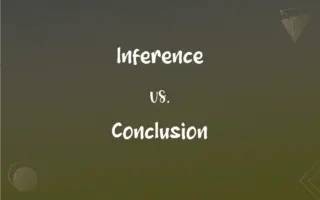Mass Tourism vs. Alternative Tourism: What's the Difference?
Edited by Aimie Carlson || By Janet White || Published on December 1, 2023
Mass tourism involves large numbers of tourists visiting popular destinations, often straining resources, while alternative tourism focuses on sustainable, unique, and often more responsible travel experiences.

Key Differences
Mass tourism is characterized by a high volume of tourists, often resulting in crowded attractions and standardized experiences. Alternative tourism, in contrast, attracts fewer tourists, focusing on more personalized and immersive experiences.
Mass tourism can lead to over-tourism, straining local resources and infrastructure. Alternative tourism aims to minimize negative impacts on the environment and local communities, often involving eco-friendly practices.
Mass tourism typically offers packaged tours and popular, well-known destinations. Alternative tourism provides unique, often off-the-beaten-path experiences, emphasizing cultural immersion and interaction with local communities.
Mass tourism is driven by large-scale tourism businesses, contributing to major economic gains for the destination but sometimes at the cost of local authenticity. Alternative tourism often supports local economies and small-scale businesses, ensuring more equitable economic benefits.
Travelers in mass tourism are often attracted by convenience and familiarity, while those in alternative tourism seek unique, authentic, and sometimes more challenging experiences.
ADVERTISEMENT
Comparison Chart
Tourist Volume
High, resulting in crowded places
Lower, offering more intimate experiences
Impact
Can strain local resources and environment
Aims to be sustainable and community-friendly
Experience Type
Packaged, standardized tours to popular sites
Unique, immersive, and culturally rich
Economic Influence
Benefits large tourism businesses
Supports local and small-scale enterprises
Traveler's Motivation
Convenience, familiarity
Authenticity, sustainability, uniqueness
ADVERTISEMENT
Mass Tourism and Alternative Tourism Definitions
Mass Tourism
Tourism involving large numbers of people visiting popular destinations.
The city was flooded with visitors during the summer, a clear sign of mass tourism.
Alternative Tourism
Seeks off-the-beaten-path destinations and experiences.
Exploring the lesser-known trails, they embraced the spirit of alternative tourism.
Mass Tourism
A form of tourism that often leads to crowded attractions and hotels.
The beach resort was a prime example of mass tourism, with tourists everywhere.
Alternative Tourism
Tourism focusing on sustainable, unique, and personalized travel experiences.
Their trip to the remote village was an exercise in alternative tourism.
Mass Tourism
Driven by large-scale tourism businesses and corporations.
The development of mega resorts in the area was driven by mass tourism.
Alternative Tourism
Often involves smaller groups and eco-friendly practices.
They joined a small group tour focusing on eco-friendly alternative tourism.
Mass Tourism
Focuses on well-known, often over-visited tourist hotspots.
The Eiffel Tower in Paris is a classic example of a mass tourism destination.
Alternative Tourism
Supports local economies and promotes responsible travel.
Her trip was planned with alternative tourism principles, supporting local artisans.
Mass Tourism
Mass tourism typically offers all-inclusive packages for convenience.
They booked an all-inclusive cruise, a popular choice in mass tourism.
Alternative Tourism
Emphasizes cultural immersion and interaction with local communities.
The travelers chose alternative tourism to experience authentic cultural immersion.
FAQs
What defines alternative tourism?
Alternative tourism focuses on sustainability, authenticity, and unique experiences.
Does alternative tourism always mean eco-tourism?
Not always, but eco-tourism is a significant aspect of alternative tourism.
What is mass tourism?
Mass tourism involves a large number of tourists visiting popular destinations.
Is alternative tourism more expensive than mass tourism?
It can be, due to its focus on quality and sustainable practices.
Do mass tourism activities offer cultural immersion?
Often, they offer less cultural immersion compared to alternative tourism.
Can alternative tourism benefit local economies?
Yes, it often supports local businesses and promotes equitable economic benefits.
Are mass tourism destinations always crowded?
Typically, yes, mass tourism destinations are known for being crowded.
Does alternative tourism require more planning than mass tourism?
Typically, yes, as it focuses on unique and sometimes remote experiences.
Can mass tourism negatively impact local communities?
Yes, it can lead to over-tourism and strain local resources.
Is mass tourism suitable for all types of travelers?
It appeals to those seeking convenience and familiar experiences.
Can mass tourism be sustainable?
Efforts are being made, but it's challenging due to its scale and impact.
Can alternative tourism include adventure travel?
Yes, adventure travel is often a component of alternative tourism.
Does alternative tourism offer luxury experiences?
It can, although luxury is not its primary focus.
Is alternative tourism a growing trend?
Yes, there's increasing interest in more responsible and immersive travel experiences.
Are alternative tourism experiences widely available?
They are becoming more available, but are not as widespread as mass tourism options.
Can mass tourism practices be modified to be more sustainable?
Yes, with conscious efforts, mass tourism can adopt more sustainable practices.
Can mass tourism lead to cultural homogenization?
It can, as it often promotes standardized experiences.
Does mass tourism contribute to environmental degradation?
It can, especially in areas with inadequate infrastructure to handle large tourist volumes.
Is mass tourism important for a country's economy?
Yes, it can be a major economic contributor, despite its potential drawbacks.
Are all-inclusive resorts considered mass tourism?
Typically, yes, as they cater to large numbers of tourists.
About Author
Written by
Janet WhiteJanet White has been an esteemed writer and blogger for Difference Wiki. Holding a Master's degree in Science and Medical Journalism from the prestigious Boston University, she has consistently demonstrated her expertise and passion for her field. When she's not immersed in her work, Janet relishes her time exercising, delving into a good book, and cherishing moments with friends and family.
Edited by
Aimie CarlsonAimie Carlson, holding a master's degree in English literature, is a fervent English language enthusiast. She lends her writing talents to Difference Wiki, a prominent website that specializes in comparisons, offering readers insightful analyses that both captivate and inform.






































































